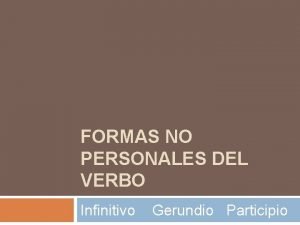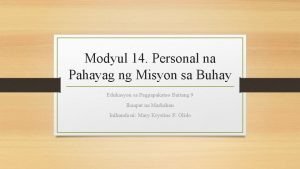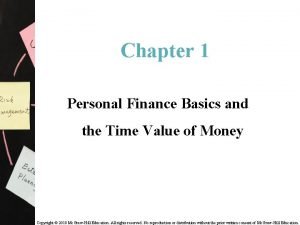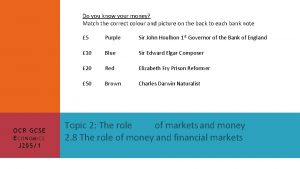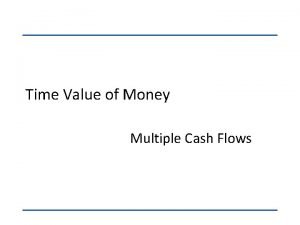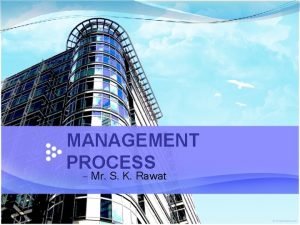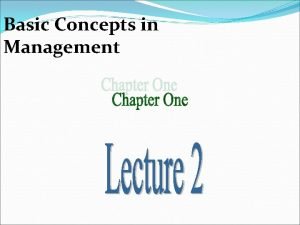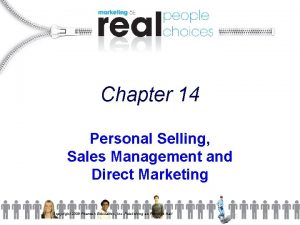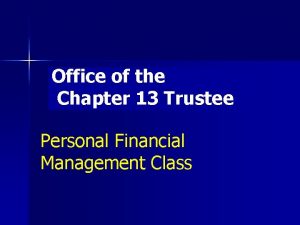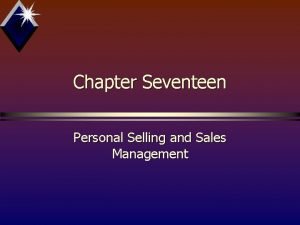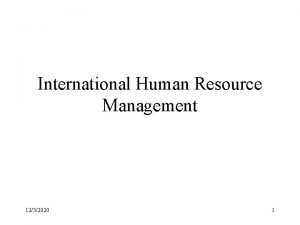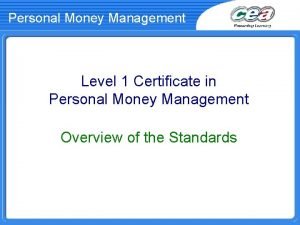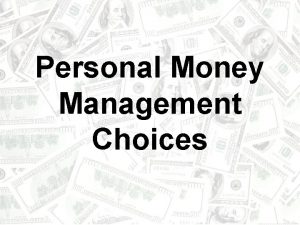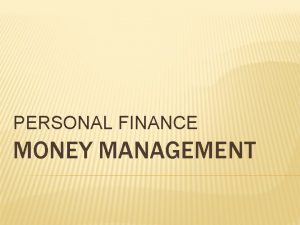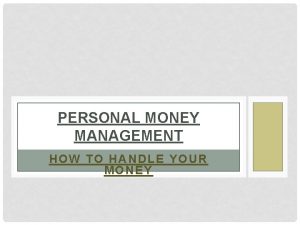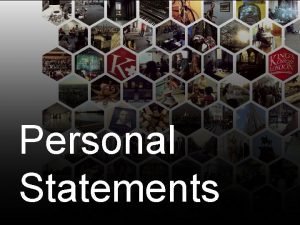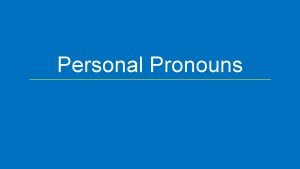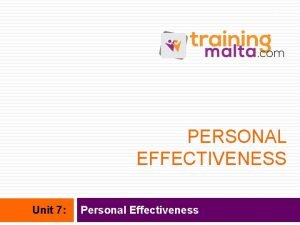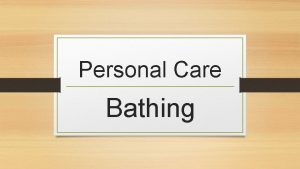Personal Money Management 1 What Is Money Money

















- Slides: 17

Personal Money Management 1

What Is Money? Money allows businesses to operate and consumers to buy products and services that meet their needs and wants. Forms of Legal Tender Coins and paper money are classified as legal tender by the government of Canada and must be accepted as payment for goods and services. Coins are minted and bank notes are issued as paper money. New Canadian Bank Notes Since 2001, the Bank of Canada has been updating bank notes with sophisticated security features. Canada’s culture, the queen and prime ministers are depicted on bank notes. 2

What Is Income? Income is money that an individual or business receives from sources, such as wages or sales, interest, and dividends. Closely related to income is the need for a financial plan that looks at how to make money grow. Types of Personal Income Forms of Employment Income • salary • piecework • wages • profit sharing • commission Employees Benefits Other sources of income can include dividends, allowance, interest, gifts, part-time jobs, and inheritance. • medical insurance • paid sick days • paid holidays • drug and dental plans 3

Agenda- January th 5 2015 1. What do you think are some of the benefits to having small businesses? 2. Read: Benefits of Small Businesses 3. Case study- Nightshifts 4

What Is Income? Gross income is the total amount of money received by a person before any deductions. Net income, or take-home-pay, is the amount of income that is left after deductions of income tax, Canada Pension Plan (CPP), and Employment Insurance (EI). Discretionary income is the amount of money that is left over after all necessities have been paid. Necessities consist of rent or mortgage, food, transportation, insurance, electricity, and so on. 5

Managing Money for Personal Use Money management is the daily financial activities aimed at satisfying a person’s needs and wants within a limited income. Individuals need to carefully plan, save, and spend their money to get the most out of it. Why We Buy Consumers choose among marketplace alternatives. Five key factors that influence consumer buying decisions include 1. income and price 2. status 3. current trends 4. custom and habits 5. promotion 6

Spending Money Today’s society is known as a consumer-driven one. This means that the economy offers consumers a never ending supply of exciting and innovative goods and services. Comparison Shopping Comparing price, quality, features, and services helps consumers make smart purchases. Comparing Price and Quality Comparison shopping means selecting the least expensive product or service that best meets the consumer’s needs and wants. Features The features of goods and services are often the most important requirements for consumers when they purchase these items. 7

Agenda- January th 12 • What Bugs You Presentation • Lesson: Spending, Buying and Budgeting • Lesson 2: Myths of Entrepreneurship 8

Spending Money Services Retail stores often offer services that complement their merchandise. Some of these are free delivery for large purchases or warranties on these items. Warranties are usually written promises that products comply to high standards. Planning and Comparing Prices and features of products or services can be compared using catalogues, newspapers, calling stores, or Internet searches. 9

When to Buy When planning a purchase, consider clearance and promotional sales as well as second-hand shopping. Consumers need to consider doing some comparison shopping for the same or similar product at other stores. Clearance Sales Retailers often have clearance (end-of-season) sales where seasonal goods are sold below the regular price to clear out old stock and to make room for new items. Promotional Sales Promotional sales happen when goods are sold below regular price to build acceptance for new products or to publicize store openings. These sales can create opportunities to sell future non-promoted products to consumers. 10

When to Buy Second-hand Shopping Second-hand shopping involves the purchasing of goods that have been previously owned by someone else. Buying such merchandise supports the three Rs of waste management— reduce, reuse, and recycle. Avoid Impulse Buying Impulse buying is purchasing items on the spur of the moment without considering whether they are needed or wanted. Ways to avoid impulse buying include taking your time, visiting many stores, checking the Internet, seeking out the best value, and, most importantly, not rushing. 11

Budgeting A budget is a plan for smart spending and savings based on one’s income and expenses. Personal Budgeting Personal budgets can be kept daily, weekly, and even monthly. Many people avoid budgeting because they believe that it is too difficult, or it will limit their enjoyment of life. However, learning to budget can actually help them find money for the things they really want or need. Setting Personal Goals Setting up a personal financial plan requires establishing realistic and achievable short- and long-term goals. Most people need to set aside specific minimum monthly amounts to achieve long-term financial goals. 12

Budgeting Preparing a Personal Budget Step 1: Calculate the amount of expected income. Step 2: Calculate expenses. èInclude regularly occurring fixed expenses. è Estimate variable expenses that change monthly. Step 3: Calculate amount left over. 13

How to start a budget 14

Minimum Wage Min Wage Tax home before CCP And EI Average Work week 37 Number of weeks in a year 52 Less: Two weeks unpaid vacation 2 Total number of weeks worked 50 Total number of hours per year 1850 Min Wage NB $10. 00 Annual Income $18, 500. 00 NB Tax Rate Less NB and Federal Income Tax CCP Less CCP EI Less EI Total Take home 24. 10% $4, 458. 50 4. 95% Max 2356. 20 $915. 75 1. 88% Max Federal 891. 12 $347. 80 $12, 777. 95 15

Your monthly take home pay would be: $1, 064. 83 16

17
 Dana damian
Dana damian Gerundio y el participio
Gerundio y el participio Adivinanzas de habitos de higiene
Adivinanzas de habitos de higiene Pansariling pagpapahayag
Pansariling pagpapahayag Personal finance basics and the time value of money
Personal finance basics and the time value of money Old money names
Old money names Money smart money match
Money smart money match Money on money multiple
Money on money multiple The great gatsby historical context
The great gatsby historical context Context of the great gatsby
Context of the great gatsby Top management middle management first line management
Top management middle management first line management Management pyramid
Management pyramid Top management and middle management
Top management and middle management Sales management & selling management
Sales management & selling management Personal selling process in sales management
Personal selling process in sales management Chapter 13 personal financial management course
Chapter 13 personal financial management course Creative selling process
Creative selling process Ihrm definition
Ihrm definition

